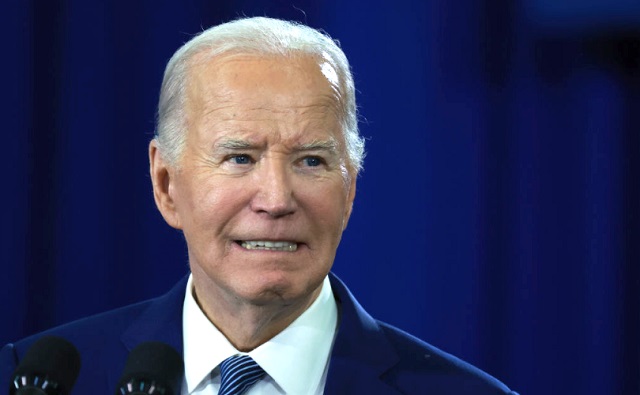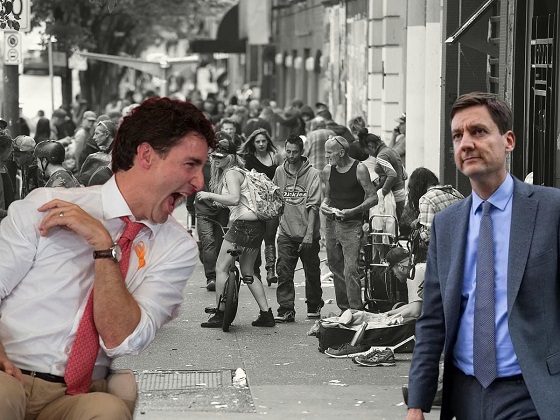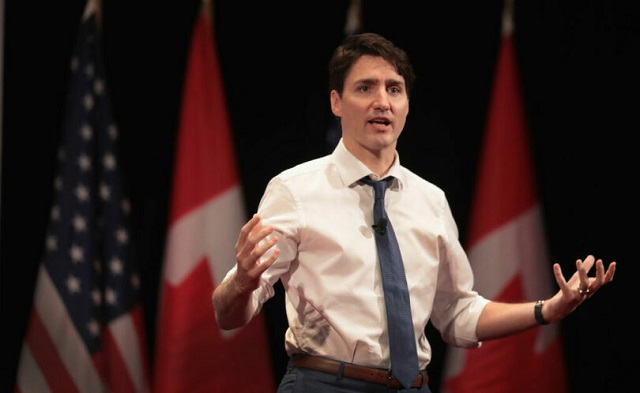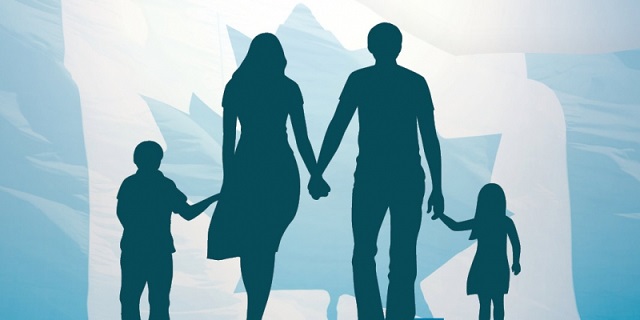Great Reset
Government Admission: Biden Parole Flights Create Security ‘Vulnerabilities’ at U.S. Airports Government Admission: Biden Parole Flights Create Security ‘Vulnerabilities’ at U.S. Airports

From the Center for Immigration Studies
DHS still refusing to say which airports are receiving inadmissible aliens from abroad
But while large immigrant-receiving cities and media lay blame for the influx on Texas Republican Gov. Greg Abbott’s busing program, CBP has withheld from the Center – and apparently will not disclose – the names of the 43 U.S. airports that have received 320,000 inadmissible aliens from January through December 2023, nor the foreign airports from which they departed. The agency’s lawyers have cited a general “law enforcement exception” without elaborating – until recently – on how releasing airport locations would harm public safety beyond citing “the sensitivity of the information.”
Now, though, CIS’s litigation has yielded a novel and newsworthy answer from the government: The public can’t know the receiving airports because those hundreds of thousands of CBP-authorized arrivals have created such “operational vulnerabilities” at airports that “bad actors” could undermine law enforcement efforts to “secure the United States border” if they knew the volume of CBP One traffic processed at each port of entry.
In short, the Biden administration’s legally dubious program to fly inadmissible aliens over the border and directly to U.S. airports has allegedly created law enforcement vulnerabilities too grave to release publicly, lest “bad actors” take advantage of them to inflict harm on public safety. Or, more specifically, here’s how CBP’s lawyers, in email communications with CIS and summarized in a CIS Joint Status Filing, characterized FOIA’s law enforcement exception (b)(7)(E) in explaining their refusal to release just the domestic U.S. airport locations:
Exception (b)(7)(E) has been applied to the identifying information for air ports of entry, which, if disclosed would reveal information about the relative number of individuals arriving, and thus resources expended at particular airports which would, either standing alone or combined with other information, reveal operational vulnerabilities that could be exploited by bad actors altering their patterns of conduct, adopting new methods of operation, and taking other countermeasures, thereby undermining CBP’s law enforcement efforts to secure the United States borders.
The agency’s attorneys floated a similar argument for withholding the locations of foreign departure airports, adding only that “bad actors” abroad who found out about the “resources expended toward travelers arriving from particular airports” could “extrapolate” from the numbers leaving foreign airports to identify the receiving U.S. airports and then undermine law enforcement’s ability to secure the border (which includes international airports).
The program at the center of the FOIA litigation is perhaps the most enigmatic and least-known of the Biden administration’s uses of the CBP One cell phone scheduling app, even though it is responsible for almost invisibly importing by air 320,000 aliens with no legal right to enter the United States since it got underway in late 2022. It remains part of the administration’s “lawful pathways” strategy, with its stated purpose being to reduce the number of illegal border entries between ports of entry. The countries whose citizens are eligible are Cuba, Haiti, Venezuela, Nicaragua, El Salvador, Guatemala, Honduras, Colombia, and Ecuador.
Under these legally dubious parole programs, aliens who cannot legally enter the country use the CBP One app to apply for travel authorization and temporary humanitarian release from those airports. The parole program allows for two-year periods of legal status during which adults are eligible for work authorization.
The government characterizes these programs as “family reunification programs”.
While seven of the nationalities, excluding Venezuelans and Nicaraguans, can claim eligibility under older family reunification parole programs, all can also just fly in if they can show they have a non-family financial sponsor (which can even be “an organization, business, or other entity”) and meet other requirements, such as owning a valid passport and passing security checks based on biometric information provided through CBP One.
Upon receiving authorization from Washington, they buy air passage to U.S. international airports where CBP personnel process them for release in short order. All are said to be responsible for paying for their own airfare.
They and inadmissible aliens from many dozens of other countries also get this parole benefit at eight U.S.-Mexico land ports of entry. That separate parole program has brought in another 420,000 immigrants from nearly 100 nations from May 2021 through December 2023, according to CIS lawsuit data updated through December 2023. (See links to the 2023 report below, which reflects data through August)
For most of the past year, big-city mayors and state governors have loudly complained about the hundreds of thousands of foreigners showing up in need of housing, food, medical treatment, clothing, and education, placing extraordinary unfunded financial burdens on local populations. Routinely, politicians and major media outlets have laid blame for the influx on Texas Gov. Greg Abbott’s busing program.
But the airport location information would undoubtedly provide a more accurate and complete picture of what is happening, though the administration would not be able to blame the Texas governor for these arrivals.
The redacted records received by CIS show a clear preference for some airports over others, with a dozen unnamed facilities receiving most of the 320,000.
Release by the government of the airport data would serve an important public interest in that it would provide voters and public officials with information to pressure the Biden government to reduce monthly arrival rates into their cities and states.
Colin M. Farnsworth, CIS’s Chief FOIA Counsel, said the Center rejects the government’s explanation about bad actors exploiting “operational vulnerabilities” at airports on grounds that CBP pre-screens and pre-schedules the arrival of CBP One applicants at each port of entry. He said CIS will litigate for a total release of the airport information.
Bad actors already have access to airport travel volumes, through CBP’s own “Traveler and Conveyance Statistics website.” Its statistics for cities whose travails with migrant arrivals are well-publicized show striking airport arrival increases from FY 2022, before the airlift program, through 2023.
Boston airports, for instance, spiked from 2.3 million during FY 2022 to 3.3 million in 2023, the public CBP website shows. Chicago, another migrant hotspot, rose from 6.3 million airport travelers in FY2022 to 7.9 million in 2023. New York City airports spiked from 17.7 million airport arrivals in 2022 to 22.9 million in 2023.
Related reports from Center for Immigration Studies FOIA litigation are based on data provided through August 2023 and the early part of September 2023. CBP has since provided data for all of September, October, November, and December 2023, which are reflected above in this report.
The following are the prior reports reflecting the earlier data:
- New Records: Biden DHS Has Approved Hundreds of Thousands of Migrants for Secretive Foreign Flights Directly into U.S. Airports
- New Records Unveil Surprising Scope of Secretive ‘CBP One’ Entry Scheme
- Thousands of ‘Special Interest Aliens’ Posing Potential National Security Risks Entering via CBP One App
- Powerful Senator Demands DHS Answer Questions About ‘Special Interest Alien” Approved Entries in CBP One app.
- Why is Biden Quietly Granting ‘Humanitarian Protection’ to Thousands of Mexicans?
Censorship Industrial Complex
Jordan Peterson, Canadian lawyer warn of ‘totalitarian’ impact of Trudeau’s ‘Online Harms’ bill

From LifeSiteNews
“You don’t even know who it is… you can be accused regardless of your intent, regardless of the factual [reality], or [the] reality of your utterance, by people who do not have to identify themselves or take any responsibility whatsoever if their denunciation turns out to be false,”
In a recent podcast episode, well-known Canadian psychologist Jordan Peterson and Queen’s University law professor Bruce Pardy blasted Prime Minister Justin Trudeau and his government over Bill C-63, the Online Harms Act, a proposed piece of legislation which, if passed, could lead to large fines and even jail time for vaguely defined online “hate speech” infractions.
“Recently, the Trudeau woke mob has managed to extend themselves even further into the legal nether lands with a new bill called C-63, which isn’t law in Canada yet, but is soon likely to be, and it is the most totalitarian Western bill I’ve ever seen by quite a large margin and in multiple dimensions,” said Peterson in a recent Everything You Need to Know video podcast dated April 14, which was posted on his YouTube channel.
“And that was my conclusion, upon reading it and then my conclusion, upon rereading it and rereading it again, because I like to make sure I have these things right.”
Joining Peterson was Canadian lawyer Bruce Pardy and podcaster Konstantin Kisin. Pardy serves as executive director of Rights Probe, a law and liberty thinktank, and professor of law at Queen’s University in Kingston, Ontario. As for Kisin, he is a Russian-British satirist, social commentator, who serves as co-host of the TRIGGERnometry YouTube show.
Peterson noted that in his view, Bill C-63 is “designed… to produce a more general regime for online policing.”
“To me, that’s what it looks like,” he said.
The trio spent the better part of two hours discussing Bill C-63, which was introduced by Justice Minister Arif Virani in the House of Commons in February and was immediately blasted by constitutional experts as troublesome.
Among other things, the bill calls for the creation of a Digital Safety Commission, a digital safety ombudsperson, and the Digital Safety Office, all tasked with policing internet content, including already illegal internet content such as child exploitation material.
However, the bill also seeks to police “hate” speech online with broad definitions, severe penalties, and dubious tactics.
Details of the new legislation to regulate the internet show the bill could lead to more people jailed for life for “hate crimes” or fined $50,000 and jailed for posts that the government defines as “hate speech” based on gender, race, or other categories.
Right at the start of the interview, Peterson noted that when thinking about Bill C-63, he thought of it as a “real masterpiece of right thinking, utopian, resentful foolishness.”
Due to the fact that the bill allows for accusations to be filed by anyone, and that there is no obligation for the government to reveal the name of the accuser to the accused, Peterson warned that Bill C-63 could see widespread corruption by individuals acting in bad faith.
“You don’t even know who it is… you can be accused regardless of your intent, regardless of the factual [reality], or [the] reality of your utterance, by people who do not have to identify themselves or take any responsibility whatsoever if their denunciation turns out to be false,” he warned.
Pardy chimed in to say that when it comes to Bill C-63, Canadians “don’t even know what the rules are going to be.”
“Basically, it just gives the whole control of the thing to our government agency, to the bureaucrats, to do as they think,” he said.
Regarding Pardy’s remarks, Peterson observed that the Trudeau government is effectively “establishing an entirely new bureaucracy” with an “unspecified range of power with non-specific purview that purports to protect children from online exploitation” but has the possibility of turning itself into an internet “policing state.”
Bill uses protecting kids as ‘cover,’ will have a ‘chilling effect upon speech’
Pardy told Peterson that one of the main issues with C-63, in his view, is that it “starts with the cover of protecting children… from online harm,” but that beneath this “great cover” it “enables” a crackdown on the “very idea of free speech.”
Pardy warned that Bill C-63 will see the return of an “old” Human Rights Act provision, titled Section 13, that was repealed by the Conservative government of Prime Minister Stephen Harper in 2013 after it was found to have violated the right to free expression.
“One of the problems with the human rights regime is that complaints can be made very, very easily without a lawyer, without any cost,” said Pardy. “And because the Canadian federal government has jurisdiction over the internet, this section is going to authorize complaints of all kinds to be made against people who are speaking their minds online…”
Pardy noted that the revival of this type of process will “have a chilling effect upon speech, no question about it,” and it risks ending the “idea of free speech itself.”
Pardy observed that society already has a mechanism to protect kids, despite modern society’s idea that the “government is responsible for keeping people safe.”
“That’s ignoring the best mechanism we already have to keep children safe, which is their parents, right. It’s assuming that this is what this state is for if you went up to somebody on the street, anybody at random,” he said.
“We’ve lost the proposition that we’ve made a choice to have this large overwhelming government tell us what to do in place of all of the other things we used to have.”
Speaking further, Pardy observed that what laws like Bill C-63, and many other laws already passed by the Trudeau Liberals such as Bill C-16, are attempting to do, is change the way people perceive how laws should be enforced.
“The ethos of managerialism has supplanted the rule of law as the basic idea instead of the rule of law,” said the law professor.
“We have rule by law now, which means that the law is nothing more than a tool for the government to use to create a law on a whim,” he continued, adding that this is “not the way the Western legal system used to work.”
Criminalizing ‘hateful’ speech is ‘troublesome’ if bureaucrats decide what is ‘hateful’
In a recent opinion piece critical of Bill C-63, law professor Dr. Michael Geist said that the text of the bill is “unmistakable” in how it will affect Canadians’ online freedoms.
Geist noted that the new bill will allow a new digital safety commission to conduct “secret commission hearings” against those found to have violated the law.
“The poorly conceived Digital Safety Commission lacks even basic rules of evidence, can conduct secret hearings, and has been granted an astonishing array of powers with limited oversight. This isn’t a fabrication,” Geist wrote.
He observed specifically how Section 87 of the bill “literally” says “the Commission is not bound by any legal or technical rules of evidence.”
Peterson noted that giving “hate speech” such prominence and such a broad definition is “troublesome” as it will be up to bureaucrats to decide what is “hateful.”
“The whole notion of hateful speech, that’s troublesome. One, for me, because there’s an obvious element of subjective judgment in it,” he said, questioning who gets to decide what is “hateful” and on what “grounds” do they have the authority to make such a judgement.
Peterson warned that if Canada decides to “open the door” of tasking bureaucrats with determining what is or isn’t “hateful” speech, and if it blocks transparency on who is making accusations of hate, it “leads us to anonymous denunciation,” which he sees as dangerous because it fails to hold complainants accountable.
To make his point, Peterson said that “everybody, including every school child who’s like older than three, and maybe even three,” understands that there’s almost “nothing worse than a snitch, and all children are wise enough to know that.”
“Even if you are being bullied at school, let’s say, it has to get pretty damn brutal and bad before going to report it to the authorities is acceptable or justifiable,” he said.
“Now you know you can debate about the conditions under which that should or shouldn’t occur. My point is that even kids know that.”
Geist has noted that when it comes to Bill C-63, the “most obvious solution” to amend the bill “is to cut out the Criminal Code and Human Rights Act provisions, which have nothing to do with establishing internet platform liability for online harms.”
Giving historcal examples for why Bill C-63 worries him, Peterson explained that “we certainly know from places like the Soviet Union, just exactly what happens, or East Germany, what happens when one-third of the citizens, which was the case in East Germany, become government informers.”
“…Trust is gone. The worst people have the upper hand. It’s a complete catastrophe… Now in Bill C-63, you have a concatenation of these problems… now you know hate speech is going to be constrained and it can be identified by anonymous informants,” forecasted the psychologist.
Indeed, it is not just Peterson, Pardy and Geist who are warning of Bill C-63, but major law groups as well.
The Justice Centre for Constitutional Freedoms (JCCF) has said Bill C-63 is “the most serious threat to free expression in Canada in generations. This terrible federal legislation, Bill C -63, would empower the Canadian Human Rights Commission to prosecute Canadians over non-criminal hate speech.”
JCCF president John Carpay recently hand-delivered a petition with 55,000-plus signatures to Canada’s Minister of Justice and all MPs, urging them to reconsider their sponsoring of the law.
Censorship Industrial Complex
Australian politicians attack Elon Musk for refusing to remove video of Orthodox bishop’s stabbing

Photo by Leon Neal/Getty Images
From LifeSiteNews
By David James
The video is available on YouTube but Australia’s political class is singling out and waging war on X owner Elon Musk for his refusal to delete footage of the stabbing of Orthodox Bishop Mar Mari Emmanuel.
In a demonstration of governmental overreach the Australian prime minister, Anthony Albanese, has attacked Elon Musk, the owner of X (formerly Twitter) for not acceding to demands to put a worldwide ban on video footage of an attempted stabbing of a bishop in a Sydney church.
Albanese is not alone; virtually the entire Australian political class has joined in the attack. Tanya Plibersek, minister for Environment and Water called Musk an “egotistical billionaire.” Greens senator Sarah Hanson-Young described him as a “narcissistic cowboy.” Albanese chimed in by describing him as an “arrogant billionaire who thinks he’s above the law.”
Senator Jacqui Lambie went as far as suggesting that Musk be “jailed” for his refusal to bend to the demands of the Australian government.
In response to Lambie’s comments, Musk declared her to be an “enemy of the people of Australia,” agreeing with another social media user who suggested it should be Lambie, not Musk, who belongs in jail.
This Australian Senator should be in jail for censoring free speech on X. https://t.co/vnYvBjpXav
— Rothmus 🏴 (@Rothmus) April 23, 2024
The right wing Liberal-National coalition was only slightly less aggressive saying Musk was offering an “insulting and offensive argument” in his refusal to remove graphic footage of the stabbing. How Musk saying that posts should not be taken down is “insulting and offensive” was not explained.
The victim of the attack, Bishop Mar Mari Emmanuel, an Iraqi-born Assyrian Australian prelate who is head of the Eastern Christ the Good Shepherd Church, has displayed a maturity and moral virtue conspicuously lacking in the political arena. Emmanuel recorded a message saying that he loved his assailant, and that he wanted the video to stay online, urging people not to respond to violence with violence.
After the incident there were riots outside the church, resulting in 51 officers sustaining injuries. A 16-year-old boy has been arrested and charged with a religiously motivated terrorist attack.
The court battle between the Australian government and Musk is being characterised as a contest between free speech and the government’s role in protecting people. Certainly for Musk it is very much about protecting free speech.
That formulation is inaccurate. There is no effective protection of free speech in Australia, unlike the US, which has the First Amendment of the Constitution. The Federal government is currently preparing a misinformation and disinformation bill to force social media companies only to allow content of which the government approves.
As Senator Ralph Babet of the United Australia Party observes it is a “censorship agenda” that will be pushed no matter which party is in power. “The office of the eSafety commissioner was created under the Liberal Party and is now being emboldened by the Labor Party,” he writes.
The public battle with Musk is better seen as an attempt by the Australian government to control what is on the internet. The newly appointed eSafety commissioner, Julie Inman-Grant directed X to remove the posts, but X had only blocked them from access in Australia pending a legal challenge. The government then demanded that the posts be removed world-wide.
That the Australian political class thinks it has the right to issue edicts in countries where it has no legal jurisdiction is a demonstration of the lack of clarity in their thinking, and the intensity of their obsession with censoring.
Musk accurately characterised the situation in a post: “Should the eSafety Commissar (an unelected official) in Australia have authority over all countries on Earth?” It seems that many Australian politicians think the answer to that question is “Yes.”
The childish personal attacks on Musk, typical ad hominem attacks (going at the person rather than the argument) are revealing. What does the fact that Musk is a billionaire have to do with the legal status of the posts? Does having a lot of money somehow disqualify him from having a position?
If he is “egotistical” or “arrogant” what does that have to do with his logical or legal claims? How does exposing Musk as a narcissistic cowboy” have any relevance to him allowing content on the platform? Wouldn’t a narcissist be more likely to restrict content? The suspicion is that the politicians are resorting to such abuse because they have no argument.
The Australian government’s attack on Musk, which borders on the absurd, is just one of many being directed at X. An especially dangerous initiative is coming from the European Union’s Digital Services Act, which can apply fines of up to 6 per cent of the worldwide annual turnover, a ridiculously punitive amount. The United Kingdom’s communications regulator, Ofcom is even worse. It will have powers to fine companies up to 10 per cent of their global turnover.
Western governments are mounting an all out push to censor the internet, and Australia’s aggressive move is just part of that. What is never considered by governments and bureaucrats is the cost of such censorship.
The benefits of “protecting” people are always overstated and inevitably infantilize the population. The price is a degradation of social institutions and a legal system that does not apply equally to the citizenry and to the government. It is a step towards tyranny: rule by law rather than rule of law.
-

 conflict2 days ago
conflict2 days agoCol. Douglas Macgregor torches Trump over support for bill funding wars in Ukraine and Israel
-

 Censorship Industrial Complex1 day ago
Censorship Industrial Complex1 day agoNow We Are Supposed to Cheer Government Surveillance?
-

 Alberta1 day ago
Alberta1 day agoRed Deer Doctor critical of Alberta’s COVID response to submit report to Danielle Smith this May
-

 Alberta17 hours ago
Alberta17 hours agoActivity-Based Hospital Funding in Alberta: Insights from Quebec and Australia
-

 Health2 days ago
Health2 days agoTransgender activists are threatening the author of scathing UK report on child ‘sex changes’
-

 Business15 hours ago
Business15 hours agoUN plastics plans are unscientific and unrealistic
-

 International2 days ago
International2 days agoBiden admin expands Title IX to include ‘gender identity,’ sparking conservative backlash
-

 Business14 hours ago
Business14 hours agoTaxpayers criticize Trudeau and Ford for Honda deal








